Comprehensive Literature Review on International Business Strategies
VerifiedAdded on 2023/05/31
|6
|1637
|355
Literature Review
AI Summary
This literature review explores various perspectives on international business. Roberts & Dörrenbächer (2012) discuss analytical viewpoints, highlighting the evolution of the field and the emergence of Critical Perspectives on International Business (CPoIB). Nicole et al. (2016) compare SEM and PLS-SEM approaches for evaluating complex research models. Gopalakrishnan (2012) examines managerial challenges in international business, emphasizing globalization and local adaptation. Trapczynski & Wrona (2013) investigate the relationship between internationalization and corporate development. Enderle (2015) focuses on business ethics in international relations, emphasizing the importance of human rights in a globalized world. The review covers key issues such as market entry, organizational challenges, and ethical considerations, providing a comprehensive overview of the current state and future directions of international business research.
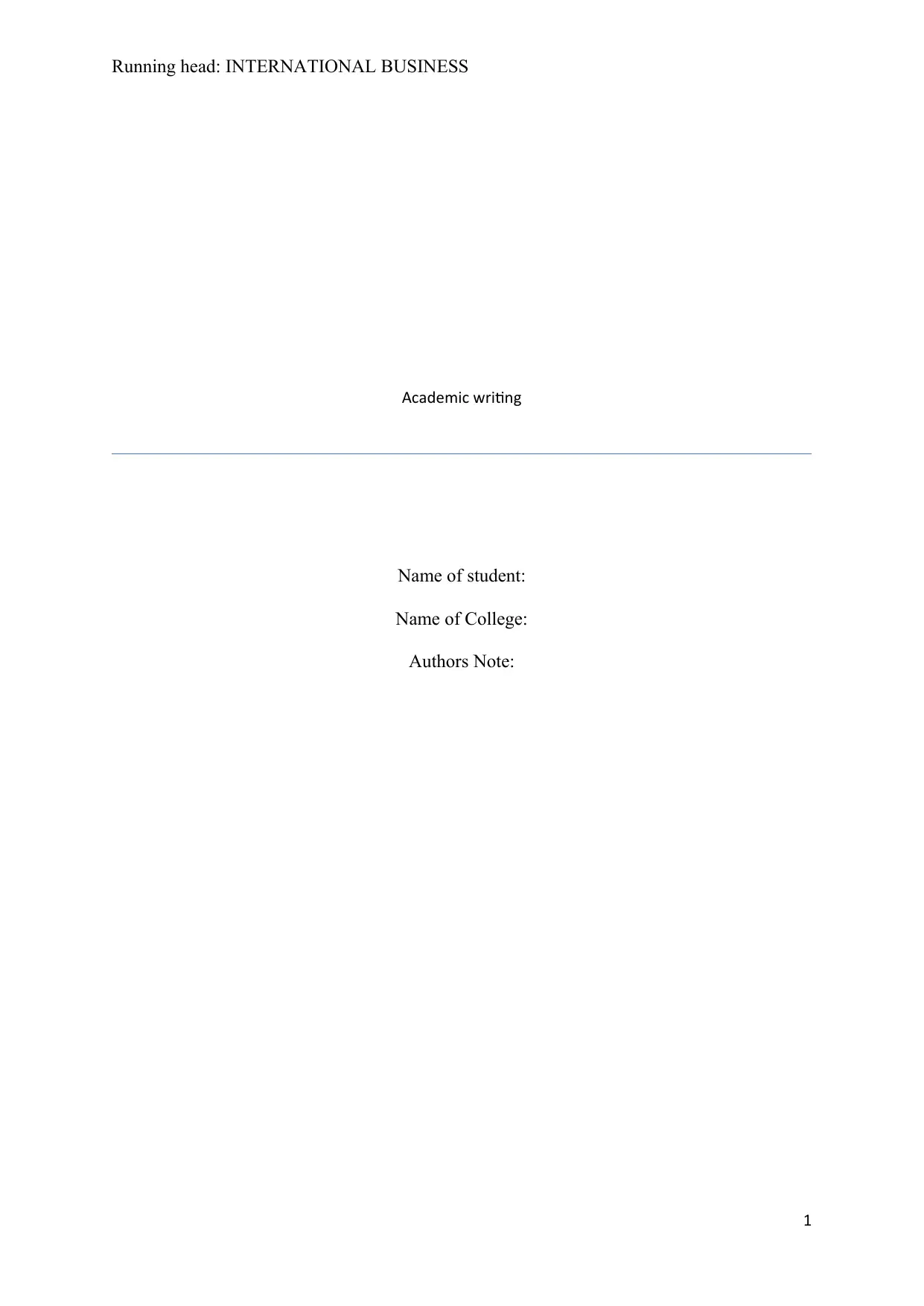
Running head: INTERNATIONAL BUSINESS
Academic writing
Name of student:
Name of College:
Authors Note:
1
Academic writing
Name of student:
Name of College:
Authors Note:
1
Paraphrase This Document
Need a fresh take? Get an instant paraphrase of this document with our AI Paraphraser
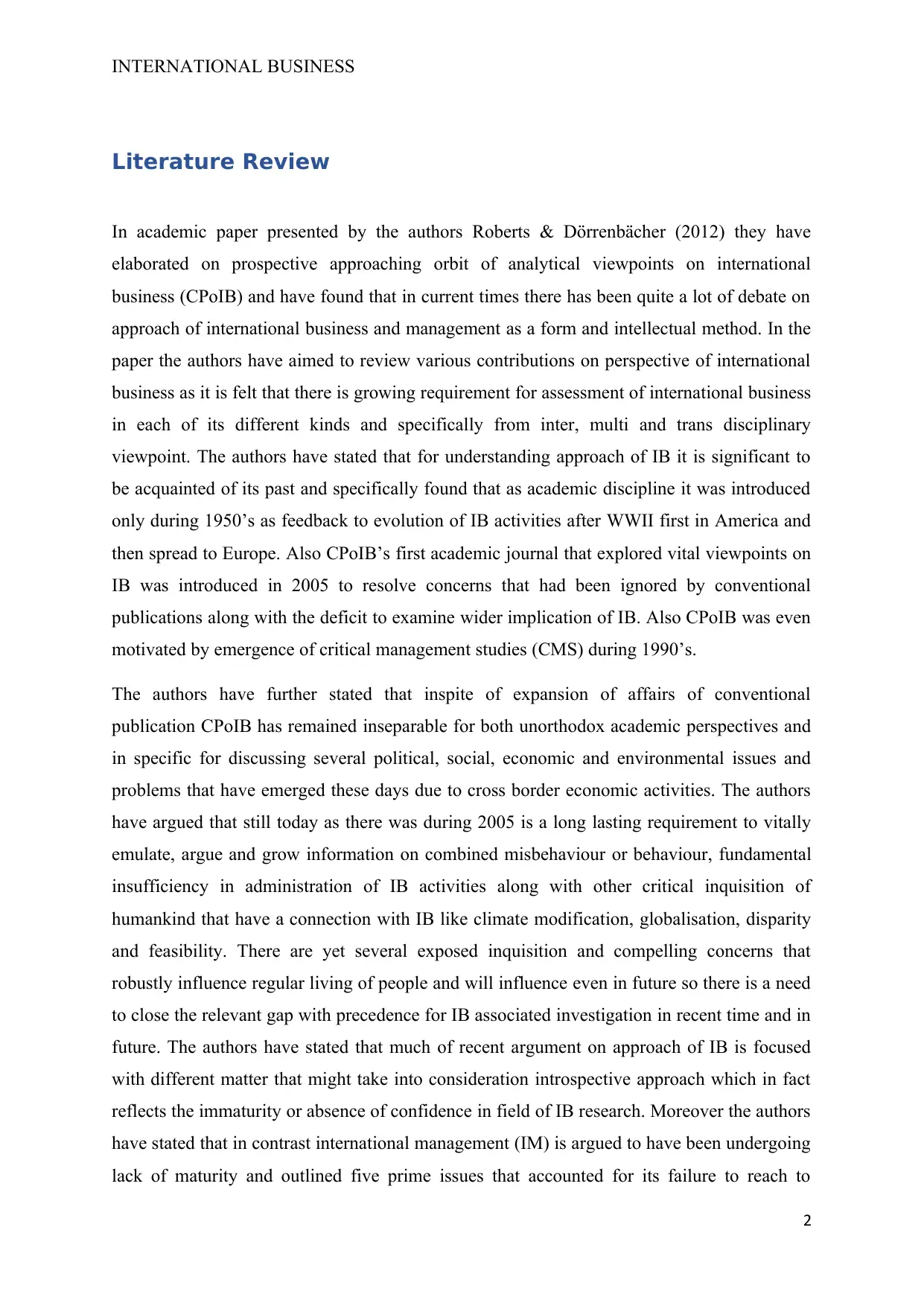
INTERNATIONAL BUSINESS
Literature Review
In academic paper presented by the authors Roberts & Dörrenbächer (2012) they have
elaborated on prospective approaching orbit of analytical viewpoints on international
business (CPoIB) and have found that in current times there has been quite a lot of debate on
approach of international business and management as a form and intellectual method. In the
paper the authors have aimed to review various contributions on perspective of international
business as it is felt that there is growing requirement for assessment of international business
in each of its different kinds and specifically from inter, multi and trans disciplinary
viewpoint. The authors have stated that for understanding approach of IB it is significant to
be acquainted of its past and specifically found that as academic discipline it was introduced
only during 1950’s as feedback to evolution of IB activities after WWII first in America and
then spread to Europe. Also CPoIB’s first academic journal that explored vital viewpoints on
IB was introduced in 2005 to resolve concerns that had been ignored by conventional
publications along with the deficit to examine wider implication of IB. Also CPoIB was even
motivated by emergence of critical management studies (CMS) during 1990’s.
The authors have further stated that inspite of expansion of affairs of conventional
publication CPoIB has remained inseparable for both unorthodox academic perspectives and
in specific for discussing several political, social, economic and environmental issues and
problems that have emerged these days due to cross border economic activities. The authors
have argued that still today as there was during 2005 is a long lasting requirement to vitally
emulate, argue and grow information on combined misbehaviour or behaviour, fundamental
insufficiency in administration of IB activities along with other critical inquisition of
humankind that have a connection with IB like climate modification, globalisation, disparity
and feasibility. There are yet several exposed inquisition and compelling concerns that
robustly influence regular living of people and will influence even in future so there is a need
to close the relevant gap with precedence for IB associated investigation in recent time and in
future. The authors have stated that much of recent argument on approach of IB is focused
with different matter that might take into consideration introspective approach which in fact
reflects the immaturity or absence of confidence in field of IB research. Moreover the authors
have stated that in contrast international management (IM) is argued to have been undergoing
lack of maturity and outlined five prime issues that accounted for its failure to reach to
2
Literature Review
In academic paper presented by the authors Roberts & Dörrenbächer (2012) they have
elaborated on prospective approaching orbit of analytical viewpoints on international
business (CPoIB) and have found that in current times there has been quite a lot of debate on
approach of international business and management as a form and intellectual method. In the
paper the authors have aimed to review various contributions on perspective of international
business as it is felt that there is growing requirement for assessment of international business
in each of its different kinds and specifically from inter, multi and trans disciplinary
viewpoint. The authors have stated that for understanding approach of IB it is significant to
be acquainted of its past and specifically found that as academic discipline it was introduced
only during 1950’s as feedback to evolution of IB activities after WWII first in America and
then spread to Europe. Also CPoIB’s first academic journal that explored vital viewpoints on
IB was introduced in 2005 to resolve concerns that had been ignored by conventional
publications along with the deficit to examine wider implication of IB. Also CPoIB was even
motivated by emergence of critical management studies (CMS) during 1990’s.
The authors have further stated that inspite of expansion of affairs of conventional
publication CPoIB has remained inseparable for both unorthodox academic perspectives and
in specific for discussing several political, social, economic and environmental issues and
problems that have emerged these days due to cross border economic activities. The authors
have argued that still today as there was during 2005 is a long lasting requirement to vitally
emulate, argue and grow information on combined misbehaviour or behaviour, fundamental
insufficiency in administration of IB activities along with other critical inquisition of
humankind that have a connection with IB like climate modification, globalisation, disparity
and feasibility. There are yet several exposed inquisition and compelling concerns that
robustly influence regular living of people and will influence even in future so there is a need
to close the relevant gap with precedence for IB associated investigation in recent time and in
future. The authors have stated that much of recent argument on approach of IB is focused
with different matter that might take into consideration introspective approach which in fact
reflects the immaturity or absence of confidence in field of IB research. Moreover the authors
have stated that in contrast international management (IM) is argued to have been undergoing
lack of maturity and outlined five prime issues that accounted for its failure to reach to
2
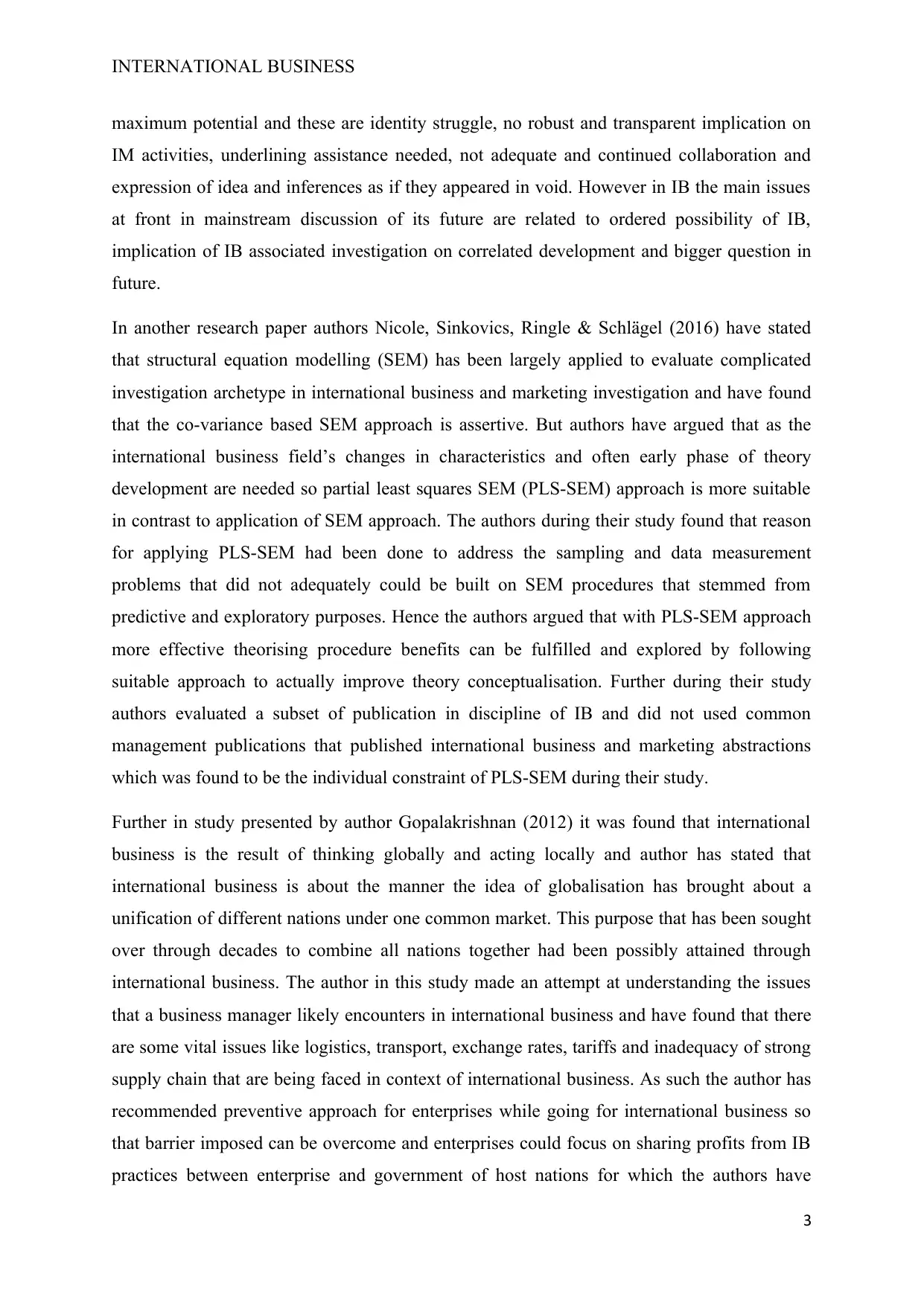
INTERNATIONAL BUSINESS
maximum potential and these are identity struggle, no robust and transparent implication on
IM activities, underlining assistance needed, not adequate and continued collaboration and
expression of idea and inferences as if they appeared in void. However in IB the main issues
at front in mainstream discussion of its future are related to ordered possibility of IB,
implication of IB associated investigation on correlated development and bigger question in
future.
In another research paper authors Nicole, Sinkovics, Ringle & Schlägel (2016) have stated
that structural equation modelling (SEM) has been largely applied to evaluate complicated
investigation archetype in international business and marketing investigation and have found
that the co-variance based SEM approach is assertive. But authors have argued that as the
international business field’s changes in characteristics and often early phase of theory
development are needed so partial least squares SEM (PLS-SEM) approach is more suitable
in contrast to application of SEM approach. The authors during their study found that reason
for applying PLS-SEM had been done to address the sampling and data measurement
problems that did not adequately could be built on SEM procedures that stemmed from
predictive and exploratory purposes. Hence the authors argued that with PLS-SEM approach
more effective theorising procedure benefits can be fulfilled and explored by following
suitable approach to actually improve theory conceptualisation. Further during their study
authors evaluated a subset of publication in discipline of IB and did not used common
management publications that published international business and marketing abstractions
which was found to be the individual constraint of PLS-SEM during their study.
Further in study presented by author Gopalakrishnan (2012) it was found that international
business is the result of thinking globally and acting locally and author has stated that
international business is about the manner the idea of globalisation has brought about a
unification of different nations under one common market. This purpose that has been sought
over through decades to combine all nations together had been possibly attained through
international business. The author in this study made an attempt at understanding the issues
that a business manager likely encounters in international business and have found that there
are some vital issues like logistics, transport, exchange rates, tariffs and inadequacy of strong
supply chain that are being faced in context of international business. As such the author has
recommended preventive approach for enterprises while going for international business so
that barrier imposed can be overcome and enterprises could focus on sharing profits from IB
practices between enterprise and government of host nations for which the authors have
3
maximum potential and these are identity struggle, no robust and transparent implication on
IM activities, underlining assistance needed, not adequate and continued collaboration and
expression of idea and inferences as if they appeared in void. However in IB the main issues
at front in mainstream discussion of its future are related to ordered possibility of IB,
implication of IB associated investigation on correlated development and bigger question in
future.
In another research paper authors Nicole, Sinkovics, Ringle & Schlägel (2016) have stated
that structural equation modelling (SEM) has been largely applied to evaluate complicated
investigation archetype in international business and marketing investigation and have found
that the co-variance based SEM approach is assertive. But authors have argued that as the
international business field’s changes in characteristics and often early phase of theory
development are needed so partial least squares SEM (PLS-SEM) approach is more suitable
in contrast to application of SEM approach. The authors during their study found that reason
for applying PLS-SEM had been done to address the sampling and data measurement
problems that did not adequately could be built on SEM procedures that stemmed from
predictive and exploratory purposes. Hence the authors argued that with PLS-SEM approach
more effective theorising procedure benefits can be fulfilled and explored by following
suitable approach to actually improve theory conceptualisation. Further during their study
authors evaluated a subset of publication in discipline of IB and did not used common
management publications that published international business and marketing abstractions
which was found to be the individual constraint of PLS-SEM during their study.
Further in study presented by author Gopalakrishnan (2012) it was found that international
business is the result of thinking globally and acting locally and author has stated that
international business is about the manner the idea of globalisation has brought about a
unification of different nations under one common market. This purpose that has been sought
over through decades to combine all nations together had been possibly attained through
international business. The author in this study made an attempt at understanding the issues
that a business manager likely encounters in international business and have found that there
are some vital issues like logistics, transport, exchange rates, tariffs and inadequacy of strong
supply chain that are being faced in context of international business. As such the author has
recommended preventive approach for enterprises while going for international business so
that barrier imposed can be overcome and enterprises could focus on sharing profits from IB
practices between enterprise and government of host nations for which the authors have
3
⊘ This is a preview!⊘
Do you want full access?
Subscribe today to unlock all pages.

Trusted by 1+ million students worldwide
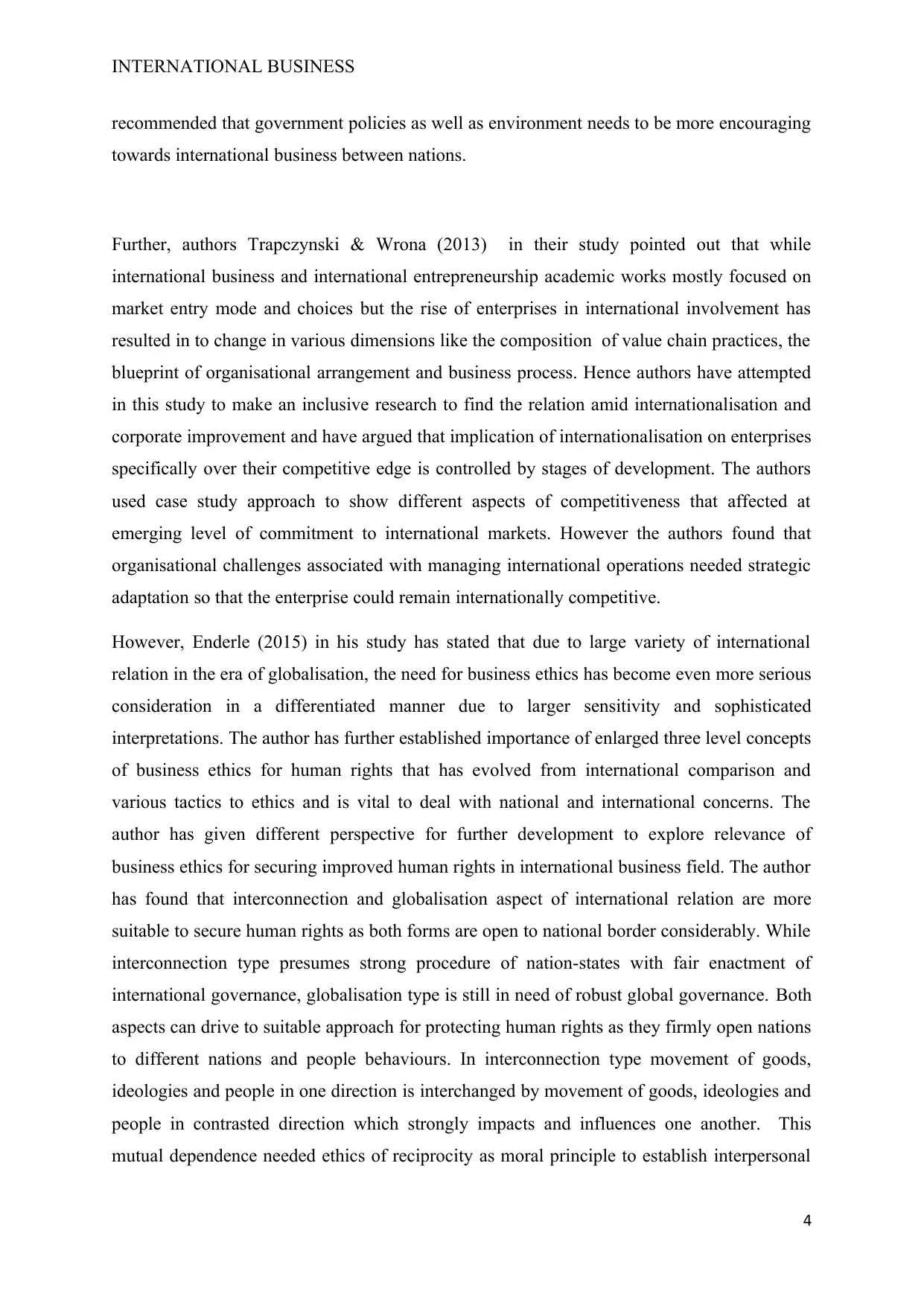
INTERNATIONAL BUSINESS
recommended that government policies as well as environment needs to be more encouraging
towards international business between nations.
Further, authors Trapczynski & Wrona (2013) in their study pointed out that while
international business and international entrepreneurship academic works mostly focused on
market entry mode and choices but the rise of enterprises in international involvement has
resulted in to change in various dimensions like the composition of value chain practices, the
blueprint of organisational arrangement and business process. Hence authors have attempted
in this study to make an inclusive research to find the relation amid internationalisation and
corporate improvement and have argued that implication of internationalisation on enterprises
specifically over their competitive edge is controlled by stages of development. The authors
used case study approach to show different aspects of competitiveness that affected at
emerging level of commitment to international markets. However the authors found that
organisational challenges associated with managing international operations needed strategic
adaptation so that the enterprise could remain internationally competitive.
However, Enderle (2015) in his study has stated that due to large variety of international
relation in the era of globalisation, the need for business ethics has become even more serious
consideration in a differentiated manner due to larger sensitivity and sophisticated
interpretations. The author has further established importance of enlarged three level concepts
of business ethics for human rights that has evolved from international comparison and
various tactics to ethics and is vital to deal with national and international concerns. The
author has given different perspective for further development to explore relevance of
business ethics for securing improved human rights in international business field. The author
has found that interconnection and globalisation aspect of international relation are more
suitable to secure human rights as both forms are open to national border considerably. While
interconnection type presumes strong procedure of nation-states with fair enactment of
international governance, globalisation type is still in need of robust global governance. Both
aspects can drive to suitable approach for protecting human rights as they firmly open nations
to different nations and people behaviours. In interconnection type movement of goods,
ideologies and people in one direction is interchanged by movement of goods, ideologies and
people in contrasted direction which strongly impacts and influences one another. This
mutual dependence needed ethics of reciprocity as moral principle to establish interpersonal
4
recommended that government policies as well as environment needs to be more encouraging
towards international business between nations.
Further, authors Trapczynski & Wrona (2013) in their study pointed out that while
international business and international entrepreneurship academic works mostly focused on
market entry mode and choices but the rise of enterprises in international involvement has
resulted in to change in various dimensions like the composition of value chain practices, the
blueprint of organisational arrangement and business process. Hence authors have attempted
in this study to make an inclusive research to find the relation amid internationalisation and
corporate improvement and have argued that implication of internationalisation on enterprises
specifically over their competitive edge is controlled by stages of development. The authors
used case study approach to show different aspects of competitiveness that affected at
emerging level of commitment to international markets. However the authors found that
organisational challenges associated with managing international operations needed strategic
adaptation so that the enterprise could remain internationally competitive.
However, Enderle (2015) in his study has stated that due to large variety of international
relation in the era of globalisation, the need for business ethics has become even more serious
consideration in a differentiated manner due to larger sensitivity and sophisticated
interpretations. The author has further established importance of enlarged three level concepts
of business ethics for human rights that has evolved from international comparison and
various tactics to ethics and is vital to deal with national and international concerns. The
author has given different perspective for further development to explore relevance of
business ethics for securing improved human rights in international business field. The author
has found that interconnection and globalisation aspect of international relation are more
suitable to secure human rights as both forms are open to national border considerably. While
interconnection type presumes strong procedure of nation-states with fair enactment of
international governance, globalisation type is still in need of robust global governance. Both
aspects can drive to suitable approach for protecting human rights as they firmly open nations
to different nations and people behaviours. In interconnection type movement of goods,
ideologies and people in one direction is interchanged by movement of goods, ideologies and
people in contrasted direction which strongly impacts and influences one another. This
mutual dependence needed ethics of reciprocity as moral principle to establish interpersonal
4
Paraphrase This Document
Need a fresh take? Get an instant paraphrase of this document with our AI Paraphraser
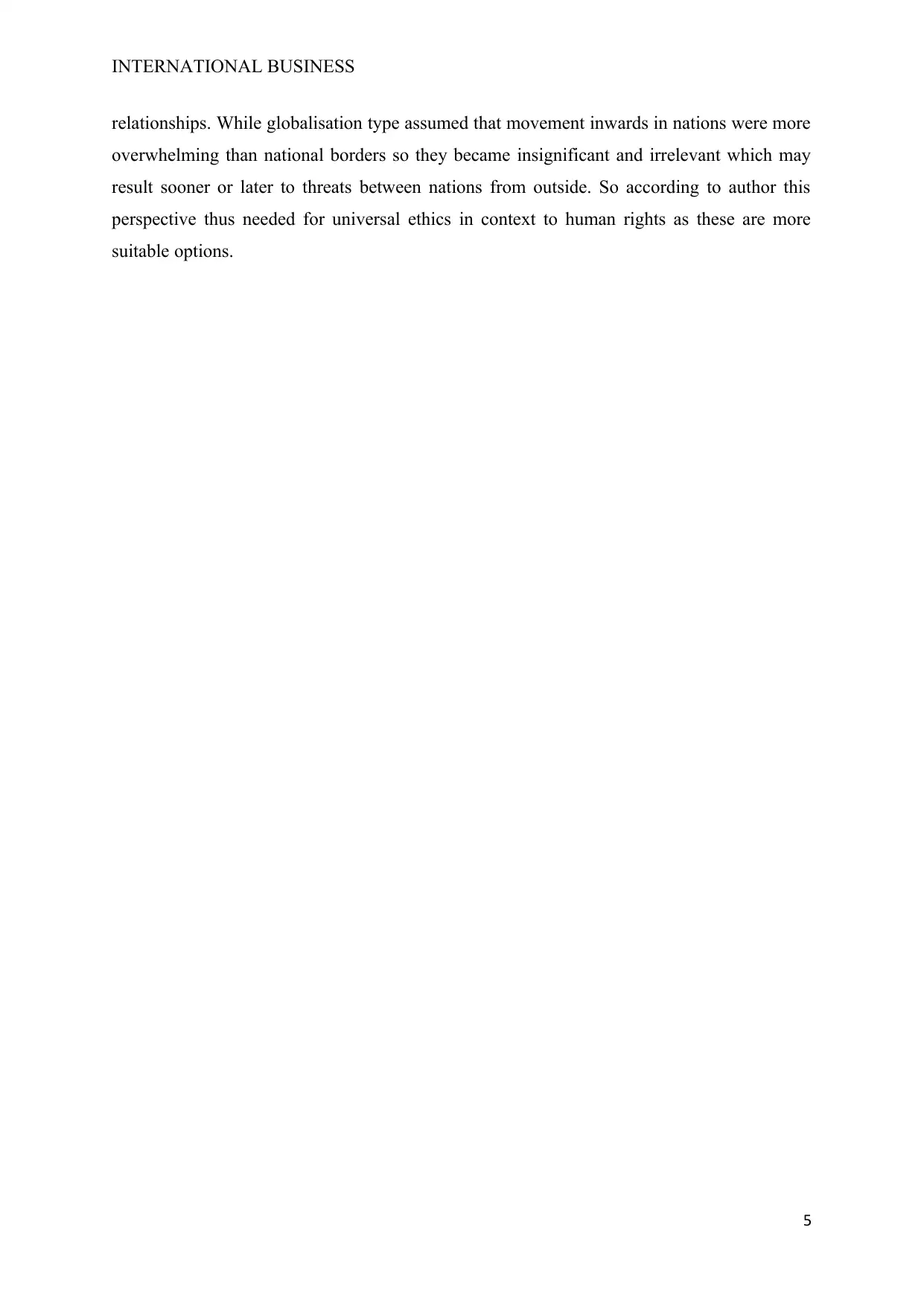
INTERNATIONAL BUSINESS
relationships. While globalisation type assumed that movement inwards in nations were more
overwhelming than national borders so they became insignificant and irrelevant which may
result sooner or later to threats between nations from outside. So according to author this
perspective thus needed for universal ethics in context to human rights as these are more
suitable options.
5
relationships. While globalisation type assumed that movement inwards in nations were more
overwhelming than national borders so they became insignificant and irrelevant which may
result sooner or later to threats between nations from outside. So according to author this
perspective thus needed for universal ethics in context to human rights as these are more
suitable options.
5
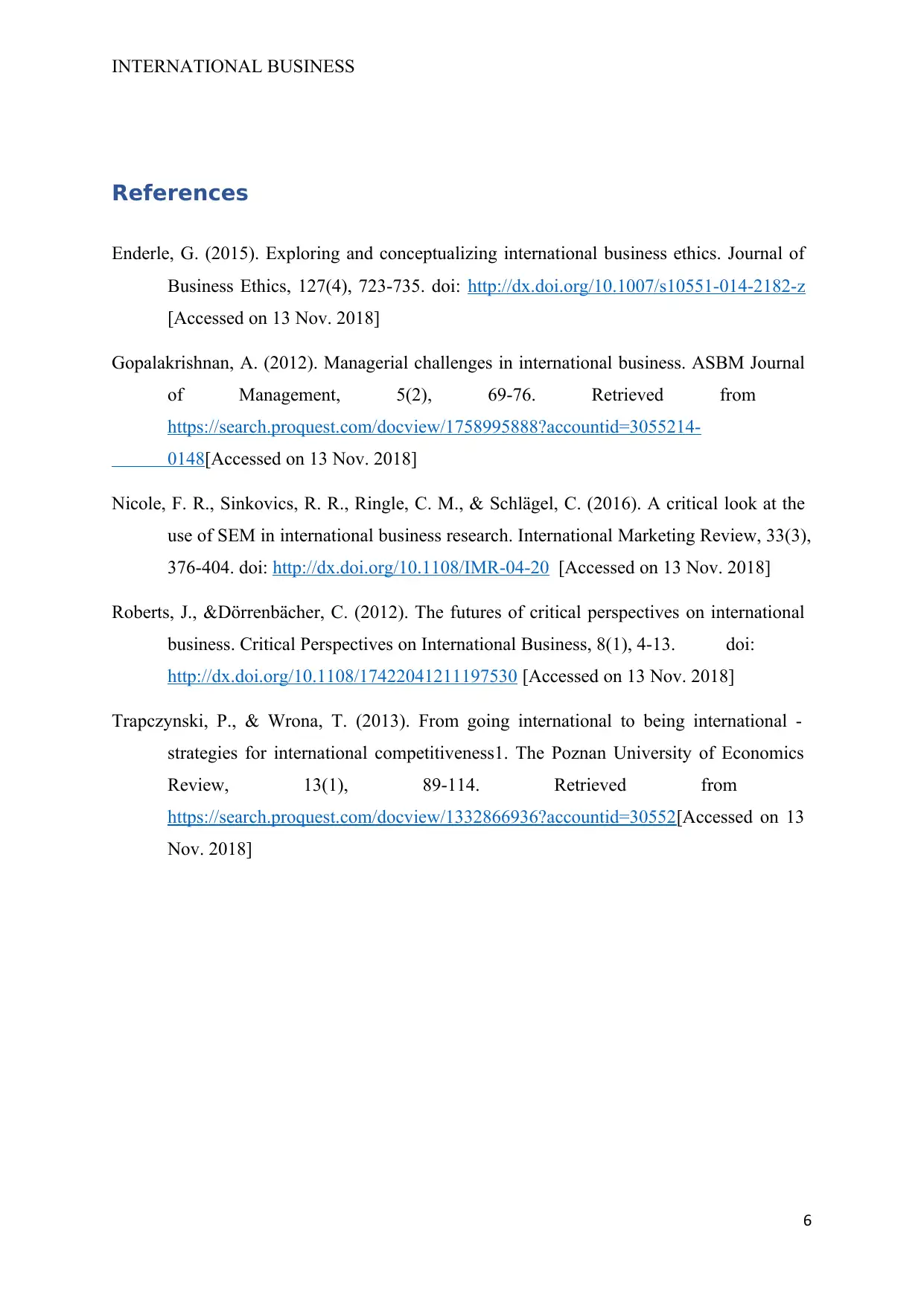
INTERNATIONAL BUSINESS
References
Enderle, G. (2015). Exploring and conceptualizing international business ethics. Journal of
Business Ethics, 127(4), 723-735. doi: http://dx.doi.org/10.1007/s10551-014-2182-z
[Accessed on 13 Nov. 2018]
Gopalakrishnan, A. (2012). Managerial challenges in international business. ASBM Journal
of Management, 5(2), 69-76. Retrieved from
https://search.proquest.com/docview/1758995888?accountid=3055214-
0148[Accessed on 13 Nov. 2018]
Nicole, F. R., Sinkovics, R. R., Ringle, C. M., & Schlägel, C. (2016). A critical look at the
use of SEM in international business research. International Marketing Review, 33(3),
376-404. doi: http://dx.doi.org/10.1108/IMR-04-20 [Accessed on 13 Nov. 2018]
Roberts, J., &Dörrenbächer, C. (2012). The futures of critical perspectives on international
business. Critical Perspectives on International Business, 8(1), 4-13. doi:
http://dx.doi.org/10.1108/17422041211197530 [Accessed on 13 Nov. 2018]
Trapczynski, P., & Wrona, T. (2013). From going international to being international -
strategies for international competitiveness1. The Poznan University of Economics
Review, 13(1), 89-114. Retrieved from
https://search.proquest.com/docview/1332866936?accountid=30552[Accessed on 13
Nov. 2018]
6
References
Enderle, G. (2015). Exploring and conceptualizing international business ethics. Journal of
Business Ethics, 127(4), 723-735. doi: http://dx.doi.org/10.1007/s10551-014-2182-z
[Accessed on 13 Nov. 2018]
Gopalakrishnan, A. (2012). Managerial challenges in international business. ASBM Journal
of Management, 5(2), 69-76. Retrieved from
https://search.proquest.com/docview/1758995888?accountid=3055214-
0148[Accessed on 13 Nov. 2018]
Nicole, F. R., Sinkovics, R. R., Ringle, C. M., & Schlägel, C. (2016). A critical look at the
use of SEM in international business research. International Marketing Review, 33(3),
376-404. doi: http://dx.doi.org/10.1108/IMR-04-20 [Accessed on 13 Nov. 2018]
Roberts, J., &Dörrenbächer, C. (2012). The futures of critical perspectives on international
business. Critical Perspectives on International Business, 8(1), 4-13. doi:
http://dx.doi.org/10.1108/17422041211197530 [Accessed on 13 Nov. 2018]
Trapczynski, P., & Wrona, T. (2013). From going international to being international -
strategies for international competitiveness1. The Poznan University of Economics
Review, 13(1), 89-114. Retrieved from
https://search.proquest.com/docview/1332866936?accountid=30552[Accessed on 13
Nov. 2018]
6
⊘ This is a preview!⊘
Do you want full access?
Subscribe today to unlock all pages.

Trusted by 1+ million students worldwide
1 out of 6
Related Documents
Your All-in-One AI-Powered Toolkit for Academic Success.
+13062052269
info@desklib.com
Available 24*7 on WhatsApp / Email
![[object Object]](/_next/static/media/star-bottom.7253800d.svg)
Unlock your academic potential
Copyright © 2020–2025 A2Z Services. All Rights Reserved. Developed and managed by ZUCOL.





